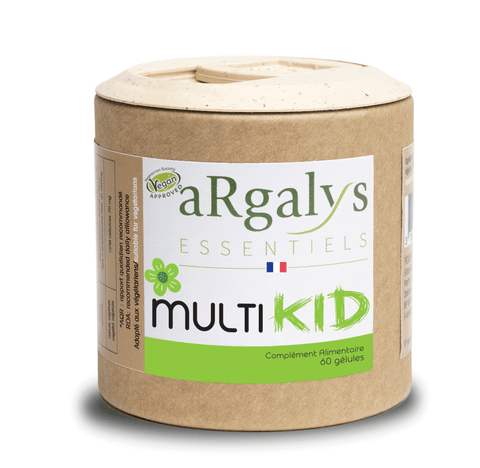Questions about vitamin B12 intake in children now go beyond the circle of vegan and vegetarian parents.
This is due to a better understanding of the fundamental role played by this vitamin in the development of young children and in particular of their brain system and their later cognitive abilities.
In addition, the low levels of vitamin B12 in 'modern' foods, including meats, are causing more and more parents to ask questions about this.
What are the consequences of a deficiency in children? Should I take vitamin B12 supplements, and how? How do I know if I can breastfeed without risk of deficiency?
These are many of the questions we have been asked in recent months.
We will therefore answer it through this article in which we will discuss the role of vitamin B12 in children, from the fetal stage to adolescence and then the means available to prevent deficiencies.
Reminder on the role of vitamin B12 in child development, from the fetal stage to adolescence
Vitamin B12, also called cobalamin, is involved in the metabolism of every cell in the human body, at all ages.
She is involved in particular in:
- The formation of the nervous system and its maintenance
- The formation of red blood cells
- Normal brain function
- Cell division
The role of vitamin B12 is essential for the development of infants and children and it is important to ensure sufficient intake throughout their growth to avoid the risk of more or less severe deficiencies appearing.
It should also be kept in mind that from the fetal stage until the age of 5, the development of the nervous and cerebral systems is more important than that of the rest of the body.
This partly explains why vitamin B12 deficiencies will affect these functions more specifically.
Consequences of vitamin B12 deficiency in children
1. Vitamin B12 deficiency in the fetal stage
A vitamin B12 deficiency in the expectant mother during pregnancy, at the fetal stage, can have serious consequences on certain cognitive and intellectual abilities of the child.
A study published in 2020 in the journal Nutrition Research highlighted the link between vitamin B12 deficiency in pregnant women and the consequences for children several years later. (1)
2. Vitamin B12 deficiency after birth
Vitamin B12 deficiency in infants (0/1 year) can also occur in the case of exclusive breastfeeding by a vegan or vegetarian mother without supplementation, a mother suffering from Biemer's disease or simply a poorly nourished mother.
A check of the mother's vitamin B12 intake is a highly recommended safety measure by the pediatrician.
The consequences of a deficiency at this stage of a child's life were highlighted in a 2017 study conducted by several pediatricians in France (2).
Doctors observed the following phenomena:
- Anemia
- Cerebral atrophy with neurological signs
- Growth retardation
Although some after-effects are sometimes irreversible, they disappear in most cases when the deficiency is treated fairly quickly with appropriate corrective treatment.
Finally, vitamin B12 deficiencies in older children (after breastfeeding stops) can have very similar consequences to those mentioned above and disrupt their growth.
How to prevent vitamin B12 deficiency in children?
Reading recent studies confirming the essential role of vitamin B12 in child development leads us to advise assessing the dietary intake of vitamin B12 in all children without exception.
Several situations require special attention:
- Breastfeeding women
If breast milk is low in vitamin B12, the child will not be able to get enough: all breastfeeding mothers, regardless of their diet, must ensure they have enough vitamin B12.
- Vegan and vegetarian breastfeeding women
Taking a suitable supplement from pregnancy is essential to ensure sufficient vitamin and mineral intake (Iodine, Calcium, Vitamin D, Vitamin E), in addition to vitamin B12, which is normally already taken regularly as a supplement.
- Children with a predominantly plant-based diet.
Today, there is no longer any debate about the possibility of balancing plant-based diets by providing the necessary macronutrients (proteins, lipids, carbohydrates), including in young children.
The particularity of the diet of children (and particularly of young people before 5 years old) compared to adults is that they have very high needs to ensure their growth but with a lower ingestion capacity, hence the need for relatively concentrated foods, particularly in proteins.
However, this can be easily achieved with plant foods.
Regular monitoring of the child's weight against the standard growth curve remains the surest way to check that everything is going well, with any 'dropouts' needing to be quickly analysed and corrected.
What is the vitamin B12 intake for a child?
Here are some keys to understanding our recommendations:
Since an overdose of vitamin B12 is not possible because the excess is very easily eliminated in the urine, it is better to have "a little too much than not enough".
The recommended dose of vitamin B12 is initially calculated per 'kilo of body mass': for simplification, adult requirements are estimated for an average weight of 70 kg.
If the recommended dose for an adult is 10 micrograms, it is in fact 10/70 = 0.14 micrograms per Kilo.
Applying the same principle to children is more complex because their weight will increase tenfold over the first 10 years: it is too complicated (and indeed pointless) to have recommended intakes of such precision that they would be impossible to follow.
Therefore, we can recommend the following dosage:
- For children from 1 year old to 8 years old: an intake of 5 micrograms per day, regardless of diet (relative to the child's weight) ensures a comfortable safety margin.
- Beyond 8 years: the dose can then be based on that of adults (10µg/day)
Reminder: for omnivorous adults the recommended intake of vitamin B12 is 2.5 micrograms/day, while it is 10 micrograms (daily intake) for plant-based diets.
To learn more about the absorption mechanisms of vitamin B12, you can consult our article on the forms of vitamin B12 .
The Argalys solution: Multi Kid Multi-vitamins and minerals for children
We have designed the Multi Kid food supplement at the request of and in close collaboration with child nutrition professionals to facilitate the balance of children's micronutrient needs and ensure their harmonious growth.
The Multi Kid supplement completely secures the intake of vitamin B12 for children from 1 year old and also provides adapted doses of Calcium, Iodine, Zinc, Vitamin E and D.
Multi Kid also comes in a safe presentation in capsules to be diluted in food to allow precise dosage and avoid the confusion of "candy = good for your health" that more playful presentations can cause.
You stay in control!
Sources:
- (1) Maternal prenatal vitamin B12 intake is associated with speech development and mathematical abilities in childhood
- (2) https://www.em-consulte.com/article/61869/stagnation-ponderale-et-regression-psychomotrice-r
- Long live B12: https://www.vivelab12.fr/combien-de-vitamine-b12-faut-il/
Our Essentials specially designed for children:

Multi Kid - Vitamins and minerals for children
€16.50 for 60 days of coverage!
 04 74 03 98 80
04 74 03 98 80










